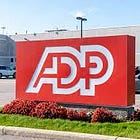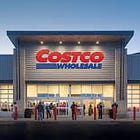Metro - A Swiss Knife Grocer - FY24
As companies start to reveal their earnings for the fiscal year 2024, here are the results for a stock in my portfolio along with a business valuation.
Welcome to my summary of Metro’s ($MRU) earnings report for fiscal 2024. For additional context, please refer to my earlier post detailing my valuation methodology.
Year-End Results
Metro ($MRU) is one of the most reliable supermarket chains in Canada. It is also an exceptional dividend grower. A set-it-and-forget-it.
Revenues increased by 2%.
Earnings per share (EPS) saw a decrease of 6%, but adjusted EPS remained unchanged.
Dividends per share (DPS) increased by 12%.
The payout ratio stayed within the company’s target range at 32%.
Operating cash flow (OCF) was $1.7 billion, and free cash flow1 (FCF) was approximately $1.2 billion.
The net profit margin remained steady at 4.4%.
The long-term debt-to-equity ratio has continued to decrease ever since the pandemic from 0.72 to 0.53. FCF to Total debt improved seven basis points to 27%.
The annualized average growth rate of the share price was +9% over five years, +8% over three years, and +2% over the past year.
The number of outstanding shares has diminished further through buybacks.
Investor Call Highlights
Increased Operating Expenses. The company faced higher operating expenses due to the commissioning of new automated distribution centers and the final phase of its Toronto fresh distribution facility providing capacity for future growth and efficiency. As a result, depreciation and amortization also increased. This should normalize going forward.
Labour Conflict. In the final quarter of the last year, a five-week labor strike at 27 Metro stores in the Greater Toronto Area significantly impacted earnings. Although labor disruptions typically negatively impact stock prices, they can present opportunities to buy additional shares at reduced prices. These disruptions are often temporary, and a high-quality company is likely to resolve them and maintain adequate performance.
Growth Will Continue. Metro anticipates a gradual resumption of profit growth in fiscal 2025 and plans to undertake 30 significant projects, comprising 12 expansions and 18 major renovations.
My Own Valuation
Metro's presence in the Canadian market is multifaceted, encompassing grocery, pharmacy, and distribution divisions, particularly in Quebec. A notable yet often overlooked aspect of Metro's business strategy is its ownership of a majority of its real estate properties. This positions the company to potentially capitalize on REIT conversions, a move that has been successfully executed by other retail behemoths such as Loblaws and Canadian Tire, revealing a substantial yet concealed potential for growth.
The $70 price range seems like the best time to load up on shares. It is currently trading at my intrinsic value level. For the long-term though, Metro will continue to be a top pick on the defensive side.
Net Income Growth: The spreadsheet presents a growth estimate that reflects the company's anticipated rise in net income for the upcoming five years, based on the average of projections from multiple analysts. The estimate is additionally adjusted down to reflect a more conservative approach.
Free Cash Flow to Equity (FCFE): This is calculated for several years, showing the amount of cash that could be distributed to shareholders after all expenses, reinvestment, and debt repayments.
Discounted Cash Flow (DCF) Valuation: The spreadsheet includes a DCF valuation section, which is a method used to estimate the value of an investment based on its expected future cash flows. It provides two valuation methods:
Perpetuity Growth: Calculated using a long-term growth rate and discounting future cash flows.
Exit Multiple: Based on an exit price-to-earnings (P/E) multiple.
Current Share Price vs. DCF Value: A table compares the current share price of ATD with the estimated share price based on DCF valuation, suggesting whether the stock is undervalued or overvalued according to the model.
Disclaimer: The information provided in this valuation analysis is for educational and informational purposes only. It does not constitute financial advice or a recommendation to buy, sell, or hold any specific stocks or securities. The valuation model presented here relies on certain assumptions, including projected future cash flows and discount rates.
Other FY24 Reviews
Free Cash Flow (FCF) is essentially Operating Cash Flow (OCF) minus capital expenditures. This figure may differ from the FCF reported in the company's financial statements.
Consider joining DiviStock Chronicles’ Referral Program for more neat rewards!
Please refer to the details of the referral program below.
Invite your friends to read DiviStock Chronicles
Thank you for reading DiviStock Chronicles — your support allows me to keep doing this work. Join our referral program!

















